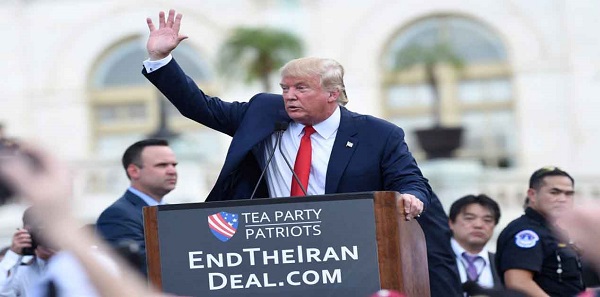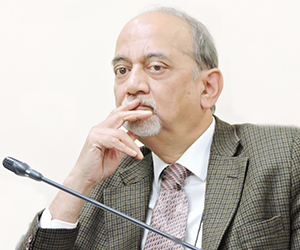US President Trump’s decision to withdraw from Iran nuclear deal was partly expected in view of his campaign statements. It was nevertheless surprising. There were last minute attempts by the E-3 – France, Germany and the UK - to persuade Trump not to withdraw. After the announcement, E-3 leaders issued a joint statement that they will continue with the agreement. The US could not carry its closest allies with its decision to abandon the nuclear deal. Meanwhile, Iran has said that it will continue to comply with its obligations in terms of the agreement, which is also supported by Russia and China. The nuclear accord, also called Joint Comprehensive Plan of Action (JCPOA), has survived, though weakened.
The International Atomic Energy Agency (IAEA) had confirmed that Iran is in compliance with its obligations under the nuclear agreement. Iran’s missile program, and regional issues, were not part of the deal. JCPOA is a disarmament agreement, not a peace treaty.
The Iran nuclear agreement is also not a bilateral agreement. It was signed by P-5 + 1 with Iran, which included US, Russia, China, UK, France and Germany. The agreement was also endorsed by the UN Security Council (UNSC) through its resolution 2231 of July, 2015. The UNSC resolution remains in effect. The clauses regarding missiles are part of the UNSC resolution. Iran’s interpretation is that it is not party to the resolution, though UNSC resolutions remain legally binding on all member states.
The effect of the US withdrawal would be to bring back nuclear related US sanctions on Iran. These may be applied over a period of three to six months. Though these may be unilateral sanctions, they also affect companies and entities of third countries dealing with Iran. This has implications for all the countries buying Iranian crude. At the moment, Iran exports more than 2.2 million barrel of crude oil. In a situation, where Organization of Petroleum Exporting Countries (OPEC) together with Russia have agreed to cut back production to support oil price, this will have an escalatory effect. No doubt, the US shale oil companies, and other OPEC exporters, would try to fill up Iran’s share. But the uncertainty would create volatility in oil market.
The effect of rise in oil prices could affect the global economic recovery. It will have an impact on trade and current account balances of oil importing countries. The oil prices, which had dipped down to USD 27 per barrel in February 2016, have gone up. It is currently trading above USD 70 per barrel. Brent crude has in fact reached USD 77.72 per barrel today. The OPEC basket of crude stands at USD 72.45, while WTI, a US marker, stands at USD 71.63 per barrel.
The US decision being supported by Saudi Arabia and Israel, it will further increase tensions in the region which has witnessed increasing strife, particularly since 2014. Though the Islamic State (IS) has lost territory, the situation in Syria and Yemen remains unsettled. The Gulf Cooperation Council (GCC) is split with Saudi Arabia – Qatar spat. Further increase in tensions will not be in any one’s interest.
The US decision also comes at a time when President Trump is planning a summit meet with the North Korean leader. The North Korean regime, which sees nuclear capacity as route to greater acceptance of that country internationally, and survival of the regime, will be less willing to accept complete de-nuclearisation now.
The US withdrawal also affects economic interests of all major countries. The European companies returned to the Iranian market after lifting of sanctions. Airbus had concluded a deal worth more than USD 20 billion to supply civilian jetliners. Three of these aircrafts have already arrived. Mercedes, Volvo, Peugeot are not simply selling their products in Iran, but have established manufacturing plants. The European countries and China have also moved into oil and gas sector. A consortium of the “Total” - a French oil major - and Chinese companies had also secured contract for development of off-shore gas block, South Pars 11. Interestingly, Boeing had also secured a large order worth more than USD 20 billion. This will be affected, though it has not been so far cancelled.
President Rouhani had increased his winning margin in the last elections in 2017. He secured 57 percent of total votes cast, as against 38.75 percent votes for Ebrahim Raeisi, his main rival. During 2013 elections, he had secured 50.7 percent votes. The increased margin was no doubt endorsement of his policy of seeking greater engagement with the international community, including the nuclear deal with P5+1. The US withdrawal from the nuclear deal will harden positions within Iran. The moderates will come under increasing pressure. If this results in Iran’s withdrawal from the nuclear accord, it will lead to sharp escalation in tensions.
India has interests in working with Iran to enhance regional connectivity India has signed contract for development of Chabahar port. It is interested in developing the port as access to Afghanistan. India also has interest in International North South Transit Corridor (INSTC). The INSTC will cut short time and cost of reaching markets in Central Asia and Russia. India’s energy security is also linked to Iran, which has huge hydro-carbon deposits, and is situated close to India. The ONGC Videsh Limited (OVL), has also been discussing development of Farzad B off-shore gas block with Iran.
According to Indian government statistics, there has been marginal 5.6 percent increase in Indian imports from Iran, which reached USD 11.111 billion in April 2017-March 2018 period. Indian exports to Iran grew by 11.46 percent to reach USD 2.652 in the same period. More than 60 percent of India’s exports consist of food items. Iran has a geo-strategic importance for India, which will require continuity in our relations with that country. President Rouhani came on a State visit to India in February this year. India of course also has friendly relations with Saudi Arabia, UAE and Israel – all three countries visited by PM Modi, apart from Iran. Indeed, he visited UAE three times. PM Natanyahu came on a visit to India in January this year.
The Indian official spokesman stressed that the Iranian nuclear issue should be resolved peacefully through dialogue and diplomacy. The statement also mentioned that “all parties should engage constructively to address and resolve issues that have arisen with respect to the JCPOA." The Government will have to decide on measures needed to deal with the situation arising out of snapping back of US sanctions. Last time, a rupee payment arrangement was worked out. This provided a channel for receiving export proceeds, and paying for import of oil. As of now, Euro channels are open, though banking difficulties will increase. No doubt, the government will take suitable steps after consultation with all stake-holders.
We may have to wait and watch full impact of the US decision on regional and international situation, as the drama unfolds in next few months. It is hoped that all sides will exercise restraint.
(The author is a former Ambassador to Iran.)
Image Source: https://www.pakistantoday.com.pk/2018/05/08/trump-to-announce-decision-on-iran-nuclear-deal-european-allies-on-edge/










Post new comment